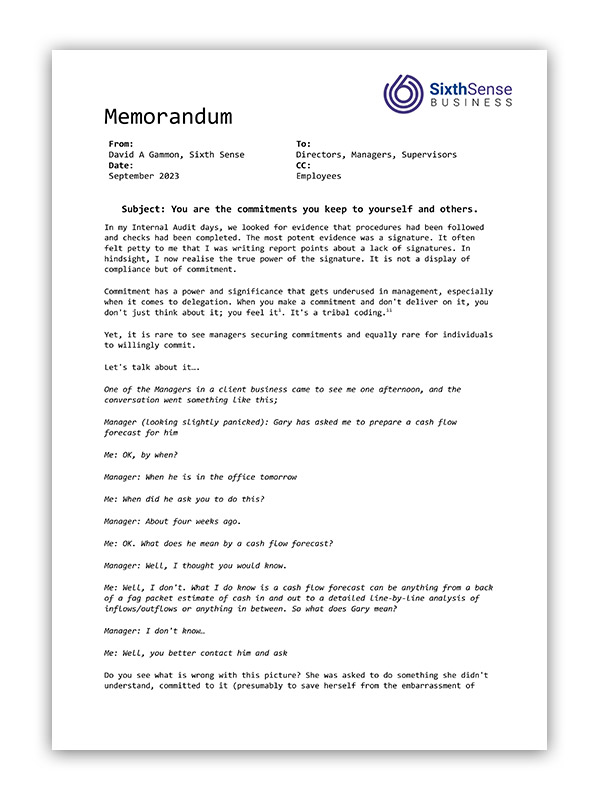From:
David A Gammon, Sixth Sense
To:
Directors, Managers, Supervisors
CC:
Employees
Date:
September, 2023
In my Internal Audit days, we looked for evidence that procedures had been followed and checks had been completed. The most potent evidence was a signature. It often felt petty to me that I was writing report points about a lack of signatures. In hindsight, I now realise the true power of the signature. It is not a display of compliance but of commitment.
Commitment has a power and significance that gets underused in management, especially when it comes to delegation.
When you make a commitment and don’t deliver on it, you don’t just think about it; you feel iti. It’s a tribal codingii.
Yet, it is rare to see managers securing commitments and equally rare for individuals to willingly commit.
One of the Managers in a client business came to see me one afternoon, and the conversation went something like this;
Manager (looking slightly panicked): Gary has asked me to prepare a cash flow forecast for him
Me: OK, by when?
Manager: When he is in the office tomorrow
Me: When did he ask you to do this?
Manager: About four weeks ago.
Me: OK. What does he mean by a cash flow forecast?
Manager: Well, I thought you would know.
Me: Well, I don’t. What I do know is a cash flow forecast can be anything from a back of a fag packet estimate of cash in and out to a detailed line-by-line analysis of inflows/outflows or anything in between. So what does Gary mean?
Manager: I don’t know…
Me: Well, you better contact him and ask
Do you see what is wrong with this picture? She was asked to do something she didn’t understand, committed to it (presumably to save herself from the embarrassment of asking what the hell he meant iii ) and then procrastinated until the last minute before asking for clarification.
This might seem like an extreme example, but it is more familiar than you think. If you delegate a task or project, the receiver has to be able and willing to commit to it. This means there needs to be a:
- Shared understanding of what is being asked for
- Sense of the skills, knowledge, time and resources available
- Method or agreed action plan
- Consideration of what might stop it from being done
- Means of measuring progress and outcome
This framework enables the employee to commit and the manager to feel confident it will get done. Anything less is wildly swinging a bat in the darkness and hoping you make contact with the ball.
So can we dispense with the vague delegation that leads to a low probability of success, stop giving people get-out-of-jail cards and then failing to hold them accountable for keeping their commitments? This behaviour doesn’t serve anyone.
(i)Remember the last time you promised someone a call and you didn’t call. How does that feel?
(ii)Failing to keep commitments in the tribe is likely to affect your status and possibly even get you expelled
(iii)Ironic given the embarrassing situation she now found herself in

